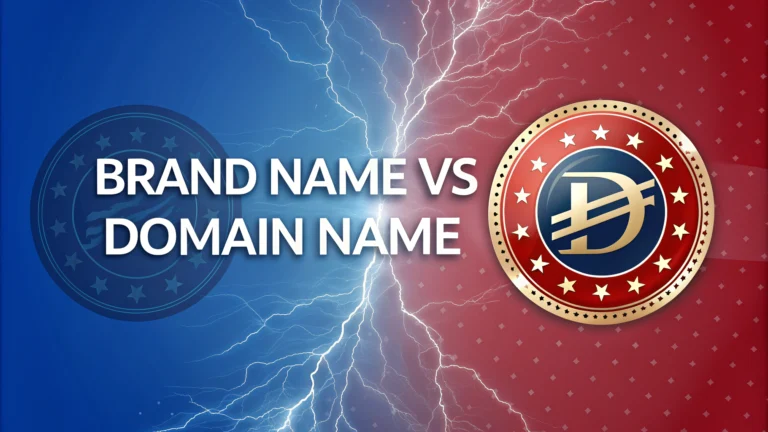A brand name represents the core identity of a company, while a domain name serves as the digital address for online presence.
Brand names communicate company personality, whereas domain names provide direct web navigation for customers.
Core Characteristics of Brand Names
Brand names typically reflect a company’s mission, values, and unique selling proposition through creative wordplay and strategic naming.
Successful brand names often incorporate elements that are:
- Memorable and distinctive
- Easy to pronounce
- Aligned with company positioning
- Emotionally resonant
Companies invest significant resources in developing brand names that capture audience attention and communicate core messaging.
Domain Name Essentials
Domain names function as precise web coordinates, enabling users to access specific online destinations quickly and efficiently.
Quality domain names share several critical characteristics:
- Short and concise
- Easy to spell
- Relevant to business offerings
- Preferably using .com extensions
Strategic Alignment between Brand and Domain
Ideally, brand names and domain names should complement each other for maximum recognition and user experience.
Businesses benefit from selecting domain names that closely mirror their brand identity, enhancing memorability and search engine optimization.
Selecting the Right Domain Name
Choosing an effective domain name requires careful consideration of branding strategy, target audience, and digital marketing goals.
| Recommendation | Impact |
|---|---|
| Match brand name | Increases brand consistency |
| Use keywords | Improves search visibility |
| Keep it short | Enhances memorability |
Professional domain strategists recommend registering multiple variations to protect brand integrity and prevent potential cybersquatting.
Legal and Trademark Considerations
Always verify domain name availability and potential trademark conflicts before final registration.
Consulting legal professionals can help navigate complex intellectual property landscapes surrounding brand and domain name selections.
Digital Branding Implications
Digital branding represents a critical intersection between brand identity and online presence, where domain names serve as powerful strategic assets. Companies must recognize that their digital representation extends far beyond mere web addresses, encompassing comprehensive online brand experiences.
Modern digital strategies require holistic approaches that integrate domain names with broader marketing communications. This means selecting web addresses that not only facilitate navigation but also reinforce brand storytelling and emotional connections with target audiences.
Technical considerations play a significant role in digital branding effectiveness. Search engine optimization (SEO), mobile responsiveness, and cross-platform compatibility become essential factors when developing domain name strategies that support comprehensive digital brand positioning.
Emerging digital trends like voice search and artificial intelligence further complicate domain name selection. Brands must anticipate technological shifts and choose domain names that remain flexible and adaptable across evolving digital ecosystems.
International Branding Perspectives
Global branding strategies demand nuanced approaches to domain name selection that transcend linguistic and cultural boundaries. Multinational organizations must carefully evaluate how domain names translate and resonate across different geographic markets.
Internationalized domain names (IDNs) have emerged as powerful tools for brands seeking authentic connections in diverse linguistic contexts. These domain extensions enable companies to represent their brand using non-Latin characters, enhancing local market relevance.
Cultural sensitivity becomes paramount when developing international domain strategies. What works effectively in one market may prove confusing or inappropriate in another, necessitating comprehensive research and localized strategic planning.
Technology and Domain Evolution
Technological advancements continuously reshape domain name landscapes, introducing new possibilities and challenges for brand positioning. Emerging top-level domains (TLDs) like .tech, .ai, and .cloud provide innovative branding opportunities beyond traditional .com extensions.
Blockchain and decentralized web technologies are introducing revolutionary approaches to domain ownership and management. Innovations like blockchain-based domain registrations offer enhanced security, transparency, and potential alternatives to traditional domain registration models.
Future Outlook
The future of domain names and branding will likely involve increased personalization, artificial intelligence integration, and more sophisticated digital identity management. Brands must remain agile, anticipating technological shifts and maintaining flexible digital strategies.
Conclusion
Successful brand and domain name strategies require continuous adaptation, strategic thinking, and a deep understanding of technological and cultural dynamics. Companies that approach domain selection as a comprehensive branding exercise will be best positioned to thrive in increasingly complex digital landscapes.

